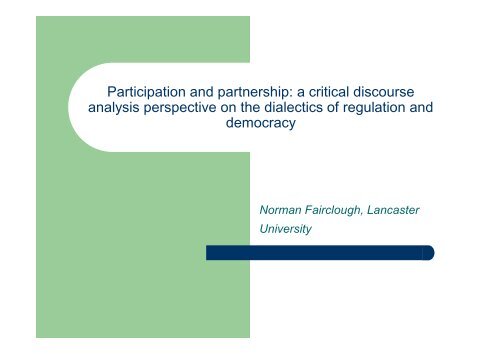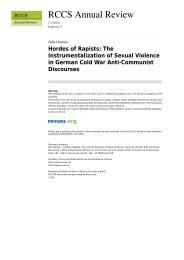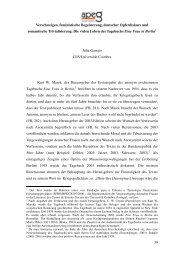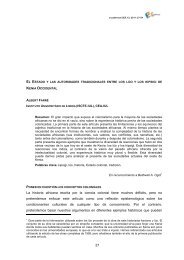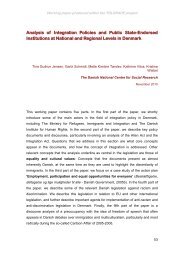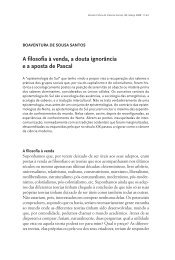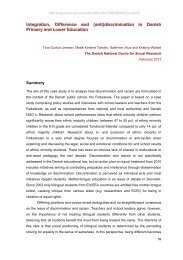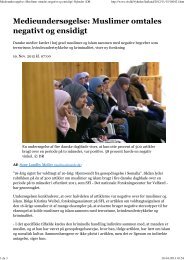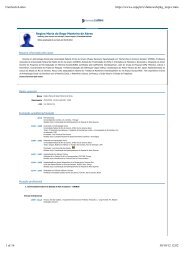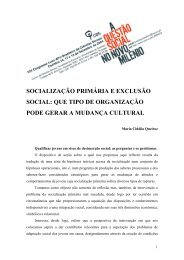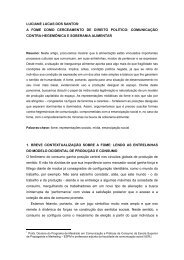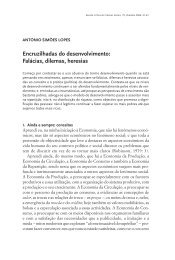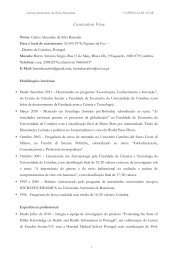Participation and partnership: a critical discourse analysis ...
Participation and partnership: a critical discourse analysis ...
Participation and partnership: a critical discourse analysis ...
Create successful ePaper yourself
Turn your PDF publications into a flip-book with our unique Google optimized e-Paper software.
<strong>Participation</strong> <strong>and</strong> <strong>partnership</strong>: a <strong>critical</strong> <strong>discourse</strong><br />
<strong>analysis</strong> perspective on the dialectics of regulation <strong>and</strong><br />
democracy<br />
Norman Fairclough, Lancaster<br />
University
Outline<br />
• Introduce + illustrate one version of ‘CDA’.<br />
– Social scientific questions, <strong>discourse</strong> aspects<br />
– Discourse in dialectical relations<br />
– Critical<br />
– ‘Transdisciplinary’
Outline<br />
• Illustration: ‘participation’ (<strong>and</strong> ‘<strong>partnership</strong>’).<br />
• Example: ‘citizenship’ in discussions over trials of GM crops.<br />
• Argument:<br />
– government tends to so limit participation as to make democratic<br />
content questionable<br />
– yet participants can sometimes move in a more democratic<br />
direction.<br />
• How can CDA contribute to addressing these issues?
Regulation <strong>and</strong> Democracy<br />
• Governments in pursuit of more participation:<br />
exclusion/alienation, effectiveness<br />
• ‘<strong>Participation</strong>’ + ‘<strong>partnership</strong>’<br />
• Metagovernance (hierarchies, markets, networks)<br />
• Regulation + democracy: logics, contradictions,<br />
dialectics
Regulation <strong>and</strong> Democracy<br />
• Democracy: adversarial; subjects/strategies<br />
• Can regulated democracy be democratic?<br />
• Questions of democracy clearly questions of<br />
<strong>discourse</strong> <strong>and</strong> dialogue<br />
• Methodological concern: CDA for a semiotic point of<br />
entry into trans-disciplinary research
Changing states: tendencies towards participation <strong>and</strong><br />
<strong>partnership</strong><br />
• ‘Keynesian Welfare National State’ > ‘Schumpeterian Workfare Post-<br />
National Regime’:<br />
– Keynesian > Schumpeterian modes of economic intervention<br />
– welfarist > workfarist approach to social policy<br />
– primacy of national scale > post-national framework<br />
– primacy of the state in compensating for market failures ><br />
networked, <strong>partnership</strong>-based governance mechanisms.<br />
• ‘Partnership’: ‘joined-up government’, widening of ‘stakeholders’,<br />
‘communities’ <strong>and</strong> ‘users’ as stakeholders.<br />
• ‘Lisbon Strategy’: structural coupling between KBE, ‘modernized’<br />
European social model, ‘open method of coordination’
Changing states: tendencies towards participation <strong>and</strong><br />
<strong>partnership</strong><br />
‘What emerged was … a hybrid model premised on neoliberalism.<br />
This involves new modes of economic <strong>and</strong> political<br />
coordination that aim to promote the EU’s competitiveness in<br />
the new global economy whilst maintaining (<strong>and</strong> ‘modernizing’)<br />
the European social model.<br />
In this context, competitiveness <strong>and</strong> social policy have been<br />
redefined in Schumpeterian workfare terms <strong>and</strong> the tasks of<br />
integration <strong>and</strong> coordination are increasingly seen as multi-level<br />
(or multi-scalar) with variable geometries <strong>and</strong> hence as suited<br />
to new forms of <strong>partnership</strong> <strong>and</strong> governance.
Changing states: tendencies towards participation <strong>and</strong><br />
<strong>partnership</strong><br />
For EU institutions typically operate less in<br />
the manner of a re-scaled, supranational<br />
sovereign state apparatus than as a nodal<br />
point in an extensive web of metagovernance<br />
operations. They have a key role<br />
in orchestrating economic <strong>and</strong> social policy in<br />
<strong>and</strong> across many different scales of action<br />
involving a wide range of official, quasiofficial,<br />
private economic <strong>and</strong> civil interests’.<br />
(Jessop 2006)
Changing states: tendencies towards participation <strong>and</strong><br />
<strong>partnership</strong><br />
• Dialectics of structures + strategies, ‘cultural political<br />
economy’ (<strong>discourse</strong>).<br />
• Lisbon:<br />
– strategy articulates KBE, ‘modernized’ social model, ‘open<br />
method of coordination’ as <strong>discourse</strong>s (imaginary).<br />
– Implementation of strategy > ‘operationalization’ of<br />
<strong>discourse</strong>s (enactment, inculcation, materialization),<br />
enactment as genres + inculcation as styles
Summary of a version of CDA<br />
• Dialectical relations, <strong>critical</strong>, trans-disciplinary<br />
• Discourses, genres styles<br />
• Dialectic between events/texts + practices/orders of <strong>discourse</strong><br />
• Intertextuality, interdiscursivity, recontextualization<br />
• CDA <strong>and</strong> cultural political economy
Field of research<br />
Objects of trans-disciplinary research<br />
– emergence of strategies<br />
– contestation between them <strong>and</strong> establishment of<br />
hegemony<br />
– recontextualization of strategies<br />
– implementation of strategies in practices (structures)
Field of research<br />
Objects for CDA as a semiotic point of entry<br />
– Emergence of <strong>discourse</strong>s, narratives, imaginaries<br />
– Hegemony struggle/ contestation between <strong>discourse</strong>s<br />
– Recontextualization of <strong>discourse</strong>s (colonisation/<br />
appropriation dialectic)<br />
– Operationalization of <strong>discourse</strong>s: enactment, inculcation,<br />
materialization; the “dialectics of <strong>discourse</strong>” (Harvey 1996),
Participatory events: some notes<br />
• Participants bring different construals of the event/process,<br />
expectations about how to proceed <strong>and</strong> orientations to being a<br />
participant, from official sources or experiences.<br />
• They bring different semiotic resources: <strong>discourse</strong>s, genres <strong>and</strong><br />
styles; intertextual <strong>and</strong> interdiscursive chains, relations of<br />
recontextualization<br />
• ‘Pre-constructed’ resources are drawn upon + articulated<br />
together in potentially innovative, novel, creative, surprising<br />
ways.
Participatory events: some notes<br />
• Discourse <strong>analysis</strong> elucidates dialectic between pre-constructed<br />
resources + interactional events; social ‘inputs’ + interactional<br />
outcomes; power of pre-constructions + of situated agency<br />
• Dialectic between regulation + democracy:<br />
– pre-constructed resources resonate with both regulatory + democratic<br />
logics<br />
– Given the dominance of regulatory logic, we must look to situated agency<br />
for the emergence of democratic logic.<br />
• Conflicts + tensions in analytically separable facets of the event:<br />
interaction/genres, identity/styles, construals/<strong>discourse</strong>s.
Crop trials<br />
• ‘The objective is not to evaluate the effects of the GMHT crops<br />
themselves, whose safety has already been approved ... It is to<br />
find out whether the herbicide management associated with<br />
these GM crops, as compared with that used on the non-GM<br />
equivalents, has any effects on some aspects of farml<strong>and</strong><br />
biodiversity’. (AEBC Crops on trial 2001)<br />
• Legislative context: EU Directives which UK Government uses<br />
to justify policy (+depoliticize trials by framing them in law <strong>and</strong><br />
science, not politics).
Crop trials<br />
• ‘Once an applicant has satisfied the requirements<br />
set out in the European rules <strong>and</strong> the release has<br />
been found to pose no significant risks to the<br />
environment or human health then the applicant has<br />
the right to grow that crop. Consents <strong>and</strong> releases<br />
may only be prevented on valid safety grounds<br />
supported by sound scientific evidence. ACRE will<br />
consider any further evidence submitted by the<br />
public that has a bearing on the assessments ACRE<br />
has made’. www.defra.gov.uk
Crop trials<br />
• No formal mechanism for public participation<br />
• Public informed after sites are chosen + can make written comments<br />
only on safety assessments.<br />
• Local councils can organize public meetings with DEFRA rep, for<br />
information not consultation.<br />
• Public participation in unofficial forms, campaigns (2 trials ab<strong>and</strong>oned<br />
after public protests).<br />
• But Government does claim that there is ‘public involvement’. DEFRA<br />
website:
Public Involvement<br />
Public involvement<br />
Q: What is being done to involve people with sites in their locality in the Farm<br />
Scale Evaluation programme?<br />
The Government involves local people in the Farm Scale Evaluation<br />
(FSE) process by providing both information about the release <strong>and</strong> an<br />
opportunity for the public to comment on the safety assessments that<br />
have been made. Copies of the consents for the GM crops involved<br />
are sent out to relevant parish councils in Engl<strong>and</strong> along with<br />
information about the release before sowing takes place. The<br />
Advisory Committee on Releases to the Environment (ACRE) will<br />
consider any representation made by local people on the safety<br />
assessments covered by these consents. In addition, DEFRA officials<br />
are available, whenever possible, to attend public meetings if called by<br />
the parish council.
Public Involvement<br />
• Involvement rather than participation or consultation<br />
• involve used transitively with the Government as subject – people<br />
don’t get involved they are involved.<br />
• People only represented as actors in commenting or making<br />
representations + even then taking up opportunity provided by<br />
Government.<br />
• Generic format: lecture + question-<strong>and</strong>-answer.<br />
• Chairs: rules for question-<strong>and</strong>-answer eg give name, village/<br />
organization, questions via chair, only questions, speak one at a time,<br />
don’t interrupt. Implicit/explicit hierachy: locals <strong>and</strong> outsiders.
Public Involvement<br />
• Speakers: DEFRA, GM company, NGO.<br />
• People did not always stick to the official generic<br />
format.<br />
– Contested genre <strong>and</strong> genre chain<br />
– Spoke + dem<strong>and</strong>ed recognition as democratic subjects<br />
(sometimes collective) with strategies on public affairs<br />
(style).<br />
– contested expertise of experts by challenging <strong>discourse</strong>s
Extract 1<br />
• M1 making statements not just asking questions.<br />
• M1 + M2 are working collaboratively.<br />
• M1 + M2 speaking as members of a collective (note<br />
we).<br />
• M1 interrupts/challenges the official + direct dialogue
Extract 1<br />
• M1 asks for solutions not answers, action not<br />
information.<br />
• M1 + M2 claim recognition as subjects in<br />
deliberations on official procedure.<br />
• M1 + M2 interweave Genre of open debate with<br />
Genre of expert-public interaction. Dialectic between<br />
regulation + democracy: democratic logic worked<br />
into the regulative form through mixed Genre.
Extract 2<br />
• Hawthorne’ s questions are element in arguments; engages in<br />
policy argumentation, using argumentative Genre<br />
• Claims recognition as a subject entitled to own strategy on<br />
matters of policy.<br />
• Arguments identify contradictions in policy<br />
• We<br />
• Support from audience indicates he speaks for a public.
Extract 2<br />
• Official’s response does not answer the question, engage with the<br />
argument, deal with policy; reiterates information already given.<br />
• Reasserts official view of crop trial process + tries to recuperate<br />
meeting for official genre chain (scientific evaluations, reports,<br />
experiment).<br />
• But includes decision-making in the chain (‘before any decision is<br />
taken as to whether this umm should be allowed to occur on a<br />
commercial basis’) - construed as consequent upon science.<br />
• Responds to questioner’s politicization by depoliticizing the policy<br />
decision, locating it in a relationship between science <strong>and</strong> government.
Extract 3<br />
• Questions are elements in an argument.<br />
• Policy moment consequent upon the scientific results, but then<br />
reformulated:<br />
So I think it’s important to bear in mind that the FSEs are allowing time<br />
for further research <strong>and</strong> for, consideration, <strong>and</strong> I think an element in all<br />
of this is err also going to be, what the people of this country want. I<br />
think that is obviously highly relevant <strong>and</strong> we have ways [ err. we have<br />
ways of expressing your views to your representatives<br />
• Rare formulation of how public ‘views’ enter the genre chain: ‘we have<br />
ways of expressing your views to your representatives’.<br />
• Scepticism of the audience - ‘you are not listening’.
Extract 4<br />
• F1 construes science as needing interpretation <strong>and</strong> open to public<br />
debate.<br />
• Industry spokesman construes science as fact ratified by experts,<br />
signed, sealed <strong>and</strong> delivered over to society.<br />
• Changing the <strong>discourse</strong> of science can help open up democratic<br />
dialogue?<br />
• The questioner ‘gets emotional’. NB the habitual official contrast<br />
between scientific rationality <strong>and</strong> ‘emotive’ public interventions.<br />
• Does not a democratic logic involves passions?
Conclusions<br />
• Public ‘involvement’ officially envisaged + enforced<br />
by chairs is very limited<br />
• Some participants shift meetings towards public<br />
deliberation of policy, challenge Government +<br />
assert their capacity/right to pursue their own<br />
strategies in policy debates as equals<br />
• A democratic logic is imposed with some success<br />
within an event/procedure controlled by a regulative<br />
logic.
Conclusions<br />
• CDA can contribute to illuminating contradiction +<br />
dialectic between regulation <strong>and</strong> democracy:<br />
– by analysing genres, <strong>and</strong> how contradiction + dialectic<br />
between regulative <strong>and</strong> democratic <strong>discourse</strong>s are<br />
operationalized in mixing of <strong>and</strong> struggle over genres as<br />
well as styles <strong>and</strong> <strong>discourse</strong>s;<br />
– by indicating how different participants intertextualize these<br />
events differently, manifest in the recontextualization of<br />
different genres, styles <strong>and</strong> <strong>discourse</strong>s
Conclusions<br />
• Suggests that regulated forms of participation/ <strong>partnership</strong> may be<br />
spaces of dialectic between democracy <strong>and</strong> regulation <strong>and</strong> of<br />
emergence of democratic moments.<br />
• There are provisos however.<br />
– Occasions are created + claimed rather than allowed, <strong>and</strong> amount to<br />
contestation of these forms.<br />
– Significance <strong>and</strong> impact on decision-making is limited by the complexity of<br />
meta-governed forms: procedures articulate elements + regulate their<br />
connection, genre chains regulated by principles of recontextualization are<br />
filtering devices which often filter out such democratic moments.<br />
– In this case, although relationship between meeting + preceding stages in<br />
the procedure/genre chain is transparent to all participants, its relationship<br />
to subsequent stages is opaque (except to officials?)
Conclusions<br />
• Comparison: <strong>partnership</strong> events in regulation of hospital rebuilding in Australia<br />
(Iedema).<br />
• Participants are oriented to recontextualization of meetings in a report,<br />
regulated by specific recontextualizing principles with filtering effects which<br />
eliminate much of the diversity of meetings.<br />
• Points arising:<br />
– different participants are likely to differ in power partly in their control over + ability to<br />
anticipate these future recontextualizations.<br />
– if there are successes in moving regulative events in a more democratic direction,<br />
these may be effectively neutralized through transformations imposed by<br />
recontextualizing principles.<br />
• Need to extend <strong>analysis</strong> from particular sorts of event to chains of events<br />
bound together within procedures + genre chains <strong>and</strong> recontextualizing<br />
principles which regulate them.


